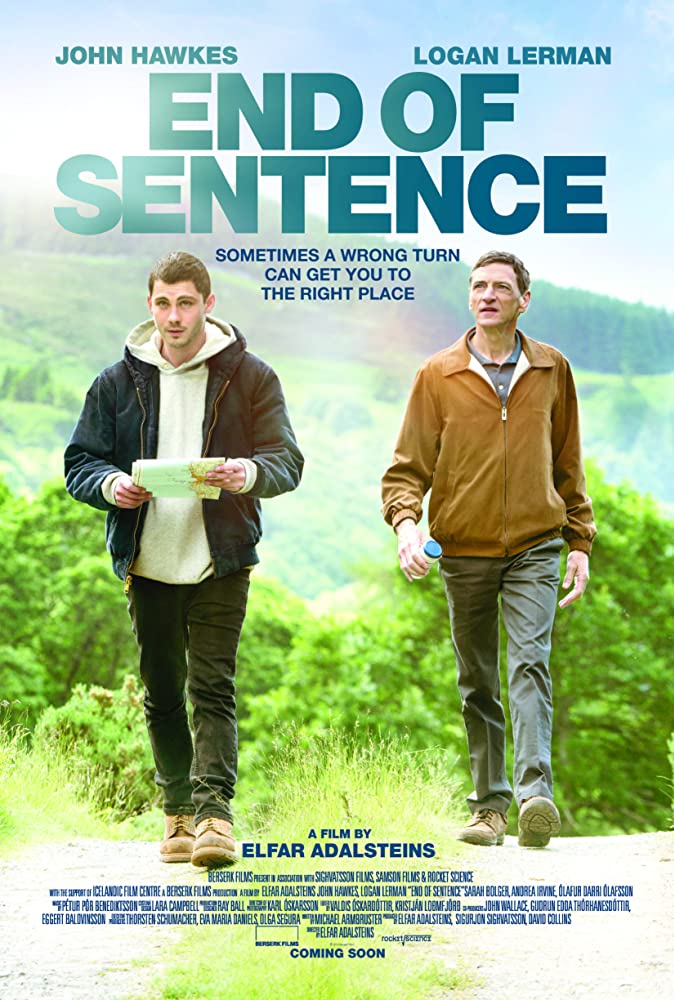Frank (John Hawkes) is recently widowed when he picks up his estranged son Sean (Logan Lerman) from prison. Neither is exactly keen to spend time with the other, but Frank’s late wife’s last wish was for her son and her husband to travel to Ireland together to scatter her ashes in a special lake. Frank is determined to honour her wish, and Sean is determined to be in California in five days time. A deal is struck – Frank promises to deliver Sean to California by way of Ireland – and two reluctant travel companions, plus the ashes of their only common bond, are on their way east – very east.

In Ireland, Frank will come to understand his dearly departed wife a little better, while Sean will come to understand his distant father. None of these will be easy lessons. In fact, long before the mission is either accomplished or abandoned, you and I will start to suspect that the dead wife orchestrated the trip not so much out of preference for her final resting place but perhaps as one last attempt to reunite the two men in her life from beyond the grave. Of course, as in life, so in death: Frank and Sean share a complicated and painful history, and the Irish countryside, beautiful as it may be, is not a magical cure.
Michael Armbruster writes a story that is sensitive but not sentimental about two men who share the same grief but process it side by side rather than together. The story is about men, and how they will relate to each other now that their moderator/interpreter/buffer is gone. It is quite possible that Frank and Sean have never been in a room just the two of them before, and quite clear that this is their preference. And yet – mother knows best? Certainly in her last days she must have worried about them, about her son already careening down the wrong path, unlikely to succeed upon release without the one person who always believed in him, and about her husband, so unable to connect, so solitary and cold in his default demeanor. The script here is brilliant because it allows us to read and explore these things through action and inaction rather than constantly looking back, and director Elfar Adalsteins reinforces this idea by showing rather than telling. This leaves room for the audience to see a bit of themselves in this dynamic: bits of their own grief, their own fraught relationships, their own pain, desire, comfort, and hope for the future, and the story becomes that much more relatable, that much more resonant.
I knew nothing of this movie when we came upon it for rent on VOD, but it turned out to be one of those unexpected cinematic gems just waiting to be mined.

Really great little sleeper movie, deservedly popular.
LikeLiked by 1 person
Showing instead of telling is key. The visual imperative is what movies should be about, not lecturing or monologueing, right? I would love to see this for that fact alone.
LikeLiked by 1 person
Sounds like a good one.
LikeLiked by 1 person
This review makes me want to see it.
LikeLiked by 1 person
Never heard of it, but sounds very interesting! Thanks for sharing 🙂
LikeLike
I just read another positive review on this as well, and I’ve also never heard of it until today. I’ll definitely seek it out.
LikeLiked by 2 people
Not one I’d heard of before either. Sounds like a worthwhile watch for the good script capable of involving you as a viewer and getting to know these characters. I hadn’t come across Elfar Adalsteins before, IMDB tells me this is only the second movie he’s produced. Shame it’s not had more publicity but you’ve provided a glowing review. x
LikeLiked by 1 person
Oh man this sounds right up my alley and I like Hawkers and Lerman in the perks of being a wallflower. Thanks Jay. Great review.
LikeLike